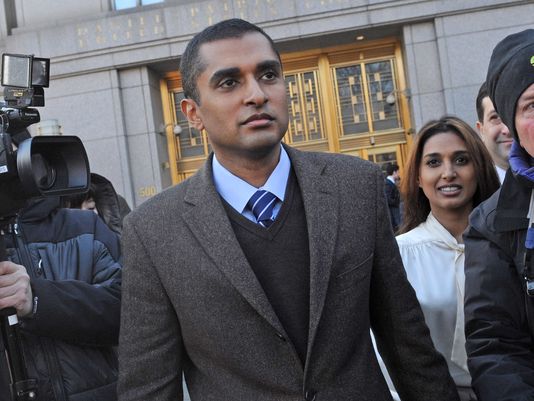Harvard expulsion revealed in trader's NYC trial
NEW YORK — A former money manager facing trial on insider trading charges was expelled from Harvard Law School more than a decade ago after he used a forged transcript he claimed he created to impress his parents to apply for a clerkship with as many as 23 federal appeals judges, according to documents unsealed Thursday.
The documents were released as prosecutors sought to introduce the Harvard ejection evidence into the trial of former SAC Capital Advisors employee Mathew Martoma in case they deem the documents necessary to rebut defense claims.
Opening statements were scheduled Friday in the trial of Martoma, of Boca Raton, Fla., who is accused of persuading a medical professor to leak secret data from an Alzheimer's disease trial.
Prosecutors said it was undisputed that Martoma used computer software in December 1998 to create a forged Harvard Law School transcript, altering his first-year grades on his official transcript by changing several B grades to A grades.
They said Martoma in late December 1998 or early January 1999 used the forged transcripts to apply for clerkships with 23 federal appeals judges.
DECEMBER: SAC Capital employee found guilty[1]
SAC CAPITAL: Judge delays approval of company's guilty plea[2]
Shortly after, the Harvard Law School registrar told Martoma that his altered transcript had been detected and he responded that "it was all a joke" and he had already withdrawn his applications to the judges, though postmarked envelopes showed they were sent a day after Martoma was confronted, the prosecutors said.
The prosecutors said Martoma, who used the name Ajay Mathew Thomas at Harvard before changing his legal name following his expulsion, later changed his defense at Harvard disciplinary proceedings to say he had forged the transcript to show it to his parents but his brother had accidentally included it in his clerkship applications.
The government said Martoma's response to a disciplinary board's recommendation of expulsion "was to create still more false forensic evidence, the most elaborate yet, in an effort to reverse the decision through Harvard's administrative appeals process."
Prosecutors said Martoma and a business partner created a bogus company called Computer Data Forensics — going so far as to create a brochure about the company's extensive experience — and writing an report "loaded with impressive sounding techno-jargon" that fooled the Harvard Law School professor handling his appeal. They said the professor issued a decision affirming Martoma's dismissal but described email evidence "as being a much closer question in light of the supposed forensic findings Martoma had fabricated."
Prosecutors said Martoma's experience with Harvard could be relevant to his understanding of materials in his insider trading case.
"Martoma … knew in the deeply personal way that life-altering personal experiences teach that electronic communications such as emails leave electronic footprints that are hard to alter or remove," the prosecutors wrote.
A message left with a Harvard spokesperson was not immediately returned Thursday.
Martoma's lawyer, Richard M. Strassberg, declined to comment.
Martoma's spokesman, Lou Colasuonno, said in a statement: "This event of 15 years ago is entirely unrelated to — and has no bearing on — this case. Raising it now is a transparent effort by the government to unduly influence the ongoing court proceedings."
Copyright 2013 The Associated Press. All rights reserved. This material may not be published, broadcast, rewritten or redistributed.










